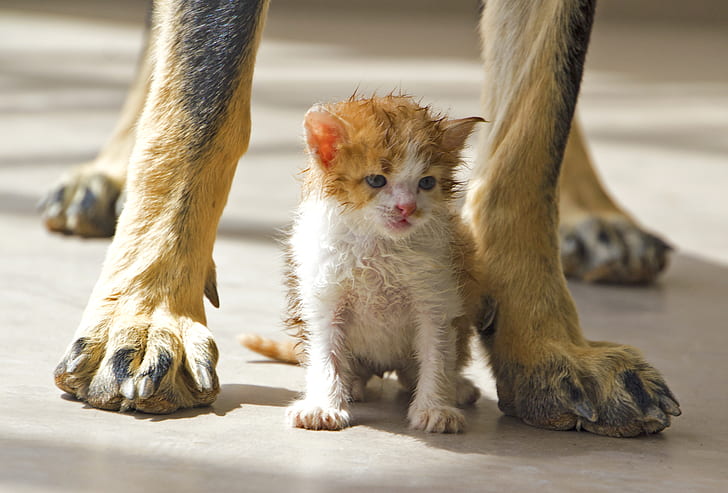If you’re a pet owner, you’ve probably wondered about the dynamics of allergies among our furry friends. It’s not uncommon for dog and cat owners to share their homes, but what happens when one pet’s presence causes the other to have allergic reactions? In this comprehensive guide, we’ll explore the possibility of dogs being allergic to cats, delve into related queries, and provide insights to help you manage your pets’ health effectively.
Main Points of Post
The Basics of Pet Allergies
What Are Allergies?
Allergies are an immune response to foreign substances, known as allergens. In pets, these allergens can come from various sources, including pollen, dust mites, mold, and dander. Dander, which is tiny flakes of skin shed by animals, is a common culprit for allergies in both humans and pets.
Can Dogs Be Allergic to Cats?
Yes, dogs can indeed be allergic to cats. While it’s less common than dogs being allergic to environmental allergens or certain foods, it is a recognized condition. The proteins found in cat saliva, urine, and dander can trigger allergic reactions in some dogs.
Signs Your Dog Might Be Allergic to Cats
If you suspect your dog may be allergic to a cat, look for these symptoms:
- Itchy Skin: Excessive scratching or biting at the skin, particularly around the face, ears, and paws.
- Red or Inflamed Skin: Areas of redness or irritation on the skin.
- Sneezing and Coughing: Similar to humans, dogs can sneeze or cough when exposed to allergens.
- Watery Eyes: Allergic reactions may cause increased tearing or redness in the eyes.
- Ear Infections: Frequent ear infections can indicate an underlying allergy.
If you notice these symptoms, it’s essential to consult a veterinarian for a proper diagnosis.
Related Queries and Their Answers
Can Cats Be Allergic to Dogs?
Absolutely, cats can be allergic to dogs as well. The proteins in dog saliva and dander can trigger reactions in sensitive cats. Signs of allergy in cats include:
- Excessive grooming or scratching.
- Hair loss or bald patches.
- Sneezing, coughing, or wheezing.
- Ear infections or inflammation.
Can a Dog Be Allergic to a Cat?
This question is often asked interchangeably with the primary query. Yes, a dog can be allergic to a cat, and the symptoms will be similar to those described earlier. Allergies in pets are quite individual, and just because one dog reacts doesn’t mean all dogs will.
Can You Be Allergic to Cats and Not Dogs?
It is possible for a person to be allergic to cats but not dogs. The allergens differ in each species, and individual reactions can vary. Factors such as genetics, exposure, and immune response play a role in how allergies manifest.
Understanding the Mechanism of Allergies
When a dog with allergies comes into contact with cat allergens, their immune system mistakenly identifies these proteins as harmful invaders. In response, it produces antibodies that trigger the release of histamines and other chemicals, leading to the symptoms we observe.
How to Manage Allergies in Pets
1. Identify and Reduce Exposure
If you suspect your dog is allergic to cats, the first step is to reduce their exposure. This can be done by:
- Keeping cats out of certain rooms, especially those where the dog spends a lot of time.
- Using air purifiers to filter allergens from the environment.
- Regularly cleaning your home to remove dander and hair.
2. Consult a Veterinarian
A veterinarian can perform tests to confirm allergies and may recommend treatments such as antihistamines, steroids, or allergy shots. They can also suggest dietary changes or supplements that might help improve your dog’s overall health and immune response.
3. Maintain a Clean Environment
Regular grooming of both your dog and cat can help reduce the amount of dander and hair in your home. Bathe your pets regularly and use pet-safe shampoos designed to reduce allergens. Vacuum frequently, and consider using a vacuum with a HEPA filter to trap allergens effectively.
4. Consider Allergy-Friendly Breeds
If you’re in the market for a new pet and have a dog that’s allergic to cats, consider breeds that are known to produce fewer allergens. While no breed is entirely hypoallergenic, some breeds are less likely to trigger allergic reactions.
The Role of Diet in Allergy Management
A dog’s diet can also play a crucial role in managing allergies. Some foods contain ingredients that can help bolster a pet’s immune system, potentially reducing allergic reactions. Talk to your veterinarian about dietary options that may benefit your dog.
Final Thoughts
Understanding whether dogs can be allergic to cats is vital for pet owners navigating multi-pet households. With proper management and care, it’s possible to create a harmonious living environment for both dogs and cats. By recognizing the signs of allergies, consulting with a veterinarian, and implementing proactive measures, you can help your furry friends live comfortably and healthily.
If you’re dealing with allergies, remember that each pet is unique, and solutions that work for one may not work for another. Stay observant, and don’t hesitate to seek professional help. With the right approach, both your dog and cat can thrive together in your home.
Additional Tips for Pet Owners
- Monitor Interactions: Keep an eye on how your pets interact. If your dog shows signs of allergy, limit their contact with the cat until you can determine the cause.
- Educate Yourself: Stay informed about pet allergies and management strategies to provide the best care for your furry friends.
By addressing these queries and providing actionable insights, we hope this article helps you better understand the relationship between dogs and cats regarding allergies. Feel free to share your experiences and questions in the comments below!



